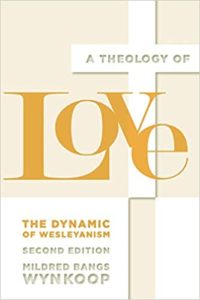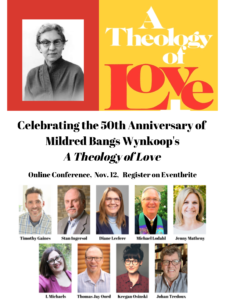A Theology of Love – 50 Years Later
Fifty years ago, a little-known theologian named Mildred Bangs Wynkoop published a provocative book.
That book, A Theology of Love: The Dynamic of Wesleyanism, still sparks conversation and controversy today. It presents a powerful argument for love as Christian theology’s priority.
Love as Central
The first third of A Theology of Love offers the heart of Wynkoop’s argument. She draws from the Bible and John Wesley’s theology to argue that we best understand Christian theology when love is front and center.
“When each doctrine of the Christian faith is identified and defined by [John Wesley],” writes Wynkoop, “the basic meaning invariably comes out ‘love.’” This means that “if one is committed to a Wesleyan theology, he must realize that his commitment is to a theology of love.”
Wynkoop argues that Jesus Christ provides the fullest revelation of who God is. Christological revelation suggests that love is God’s reigning (but not only) attribute. Jesus called God “Abba,” and he declared the greatest two commandments to be love for God and others as oneself.
Past and present theologians have not agreed with Wynkoop. They question whether love can play the central role in theology. They worry that love – without qualification – is too sentimental and mushy.
Wynkoop counters this charge. “Love is not a soft, permissive cover-up of human personality,” she says. “Love… is the disciplining of human reactions.” I have addressed Wynkoop’s view of love in various books and this blog essay.
Furthermore, says Wynkoop, “Christian love creates an atmosphere in which all the creative conflicts may not only exist but be matured and fully utilized without tearing apart the fabric of Christian unity.”
Upcoming Conference Celebrates A Theology of Love
On November 12, a group of Wynkoop scholars is coming together to celebrate the 50th anniversary of A Theology of Love.
This fully-online conference features Tim Gaines, Stan Ingersol, Diane Leclerc, Michael Lodahl, Jenny Matheny, L Michaels, Thomas Jay Oord, Keegan Osinksi, and Johan Tredeaux. Four hour-long sessions that comprise the conference will be recorded and made available as downloads for 3 months to those who register.
For more information and to register, see this link.



Comments